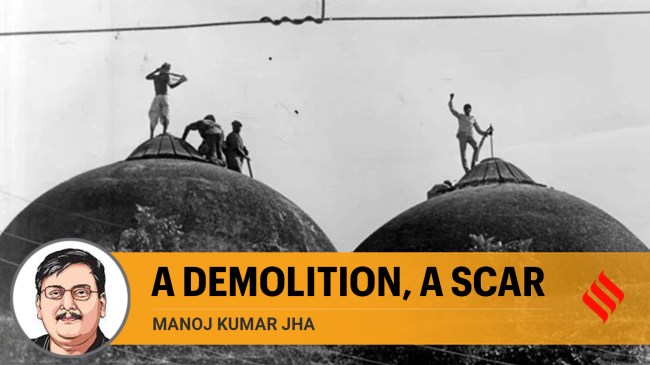Opinion Manoj Kumar Jha writes: Remember Babri Masjid — a demolition, a scar
Thirty-two years ago, the Bharatiya Janata Party and the Sangh Parivar’s intolerance, didn’t only bring down a place of worship. It also rent asunder the social fabric of India - the country is still grieving.
 The dust of the Babri Masjid demolition is suffocating the country. (Express Archive)
The dust of the Babri Masjid demolition is suffocating the country. (Express Archive) Like every year since December 6, 1992, let us confront one of the most painful chapters in our nation’s democratic journey — the demolition of the Babri Masjid. It represented a dangerous moment when sectarian forces overwhelmed the rule of law, when mob violence triumphed over constitutional values, and when the inclusive vision of our founding fathers and mothers was trampled. The demolition of the historical structure was also a symbolic assault on the pluralistic principles enshrined in our Constitution. Thirty-two years ago, the mob, fed on a steady diet of religious intolerance by the Bharatiya Janata Party (BJP) and the Sangh Parivar, not only brought down a place of worship but also rent asunder the social fabric of India, altering it for the foreseeable future at least.
The BJP and the Parivar leveraged religious sentiments, transforming a local dispute into a national electoral narrative. They polarised communities and weaponised cultural symbolism for consolidation. It was never really a religious movement; it was always about politics and power. Let us not forget that temple construction was a central promise that was featured in the BJP manifestos election after election for decades.
The discriminatory policies and attitude of the two previous BJP majority governments as well as of the incumbent minority government towards Muslims in particular, and minorities, Dalits, and backward castes in general, flow from the refashioning of the BJP and the Parivar’s political agenda in the late 1980s. Their staunch Hindutva project was a response to the contradictions of liberalising India, the political awakening and resurgence of the backward communities, and a variety of movements for social and economic justice. The project essentially was and remains an attempt to create a context to mobilise and bind Hindu communities and help restore the traditional and hierarchical social order. It was, what many observers have called, a revolution from the top. Muslims were painted in broad strokes through slurs and slogans as outsiders and aggressors and presented as an enemy of the Hindus. Today, the list of enemies has expanded to include Opposition leaders and political parties, farmers, NGOs, independent media, professors, human rights defenders, and anyone who dares to raise a voice for the rule of law and social justice.
Instead of offering a positive identity and a promise of progress, the Hindutva project thrives on resentment, outrage, discrimination, and violence. Hundreds of people died before the fateful demolition of the mosque as the then BJP president, L K Advani, went around the country rousing passions. Hundreds of people died in the aftermath of the demolition. There has been little to no accountability for the destruction and death.
The Hindutva project remains obsessed with real and imaginary pasts and has little to offer by way of a future. All of these tendencies can be observed in the controversies that the BJP and the Parivar are trying to stoke today with impunity.
The dust of the Babri Masjid demolition is suffocating the country. As our leader Lalu Prasad wrote a few years ago in the same context, “The politics that gained currency in the wake of the Babri Masjid demolition is the counterfeit version of ethical politics. Only lip service is paid to values such as honesty, hard work, propriety, development but the real value of such politics is nil. In fact, just like counterfeit currency slowly suffocates the economy, this counterfeit brand of politics has slowly taken over our institutions and processes, and communalised all aspects of our national lives”.
The current government has systematically weakened independent institutions. The judiciary’s impartiality is often called into question in how it deals with critical challenges to government policies. The Election Commission, once a neutral body, now appears to be a compliant tool.
Today, I remember this tragic event with millions of fellow citizens, not to reopen wounds but to reaffirm our collective commitment to healing. Even as perpetrators of the demolitions roam free and justice seems elusive, we must transform this painful memory into a resolute pledge — that we will resist religious divisions from fragmenting our national unity and that we will do our best to make sure that principles of secularism and mutual understanding triumph over divisive politics.
The writer is a Rashtriya Janata Dal Rajya Sabha MP. Views are personal





